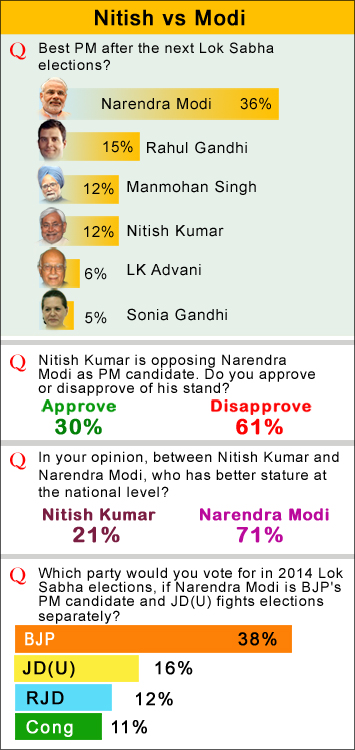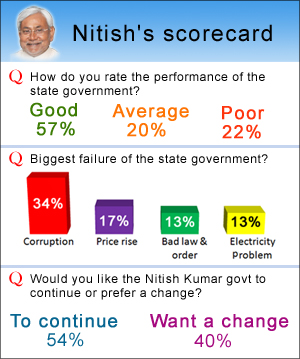 A LensOnNews poll carried out among voters in Bihar in the last week of June found that in response to the open-ended question “Who, in your opinion, is the best candidate for PM in the next Lok Sabha elections?”, a plurality of 36 per cent named Narendra Modi. Rahul Gandhi was next in the line of preferences with 15 per cent, followed by Manmohan Singh and Nitish Kumar at 12 per cent each, L.K. Advani at 6 per cent and Sonia Gandhi at 5 per cent. A LensOnNews poll carried out among voters in Bihar in the last week of June found that in response to the open-ended question “Who, in your opinion, is the best candidate for PM in the next Lok Sabha elections?”, a plurality of 36 per cent named Narendra Modi. Rahul Gandhi was next in the line of preferences with 15 per cent, followed by Manmohan Singh and Nitish Kumar at 12 per cent each, L.K. Advani at 6 per cent and Sonia Gandhi at 5 per cent.
Significantly, moreover, as many as 61 per cent say they disapprove of Nitish Kumar’s stand against Narendra Modi as NDA’s candidate for PM. And 71 per cent say Narendra Modi has the necessary national stature to be PM, while only 21 per cent think the same of Nitish Kumar.
Nitish’s magic waning
The survey found that a majority of voters (54 per cent) favour Nitish Kumar’s continuation as chief minister against only 40 per cent who would prefer a change in the state government. However, nearly half of the sampled voters (49 per cent) feel that that the last tenure of the ruling alliance was better than the present one. The slide in the popularity Nitish’s regime in its second term can be mainly attributed to the perception of growing menace of corruption in the state: 34% of sampled voters mentioned it as the state government’s biggest failing. It would be true to say that the haunting memories of RJD’s past misrule and the absence of any viable alternative mainly account for the Nitish Kumar government’s current favourable rating.
BJP preferred for Centre
The LensOnNews poll also sought the opinions of Bihar voters on the performance of the UPA government at the Centre and their voting intention if the Lok Sabha elections were held now. As many as 41 per cent rate the performance of PM Manmohan Singh’s government at the Centre as ‘Poor’ against only 23 per cent who feel it has been ‘Good’.
 The biggest failure of the Central government has been the runaway increase in prices according to 62 per cent of the respondents, with the issue of corruption taking a distant second place (only 11 per cent say it has been the biggest failure of the government). The biggest failure of the Central government has been the runaway increase in prices according to 62 per cent of the respondents, with the issue of corruption taking a distant second place (only 11 per cent say it has been the biggest failure of the government).
Not surprisingly, 68 per cent would like a change of government at the Centre in the next Lok Sabha elections, with only 24 per cent saying the present UPA government should continue.
Asked which party, in their opinion, would give the best government at the Centre, 50 per cent picked the BJP while only 23 per cent plumped for the Congress. And if elections to the Lok Sabha were held now, 34 per cent say they would vote for the BJP, while 18 per cent pick the JD (U). Lalu Prasad’s RJD is at 15 per cent, with the Congress coming in fourth at a low 12 per cent.
What if...?
Thus the present NDA alliance of BJP-JD(U) is poised to sweep the next Lok Sabha elections in Bihar – if the two parties stay together till then, which is a big IF. Nitish Kumar is clearly straining at the leash. He has not only been making demands for a PM candidate being ‘acceptable’ to him, he has also been making open overtures to the UPA, as witness his support to Pranab Mukherjee’s candidature for President and his wangling a special fiscal package for Bihar from the Central government. There is a strong likelihood of a JD(U) split from the NDA before the next Lok Sabha elections, if not sooner.
 The LensOnNews survey therefore asked the contingent question: Which party would you vote for in the next elections if Narendra Modi is BJP’s candidate and the JD(U) fights the elections separately? Here the BJP leads the field with a 38 per cent vote, with JD(U) next with 16 per cent, the RJD getting 12 per cent and the Congress 11 per cent. The LensOnNews survey therefore asked the contingent question: Which party would you vote for in the next elections if Narendra Modi is BJP’s candidate and the JD(U) fights the elections separately? Here the BJP leads the field with a 38 per cent vote, with JD(U) next with 16 per cent, the RJD getting 12 per cent and the Congress 11 per cent.
Clearly the BJP as a national party is favoured by the Bihar electorate in elections to the Lok Sabha, even while they give strong support to the JD(U) at the state level.
What if Nitish Kumar joins the UPA and fights the next Lok Sabha elections alongside Congress and against the BJP? Our findings show that the JD (U)-Congress combine would trail the BJP’s 38 per cent vote share by a wide margin as the combined vote share of JD (U) and Congress adds up to only 27 per cent (16 per cent of JD (U), 11 per cent of Congress).
The LensOnNews poll was carried out between June 21 and 27 among a representative cross-sectional sample of 2147 voters spread across nine assembly constituencies in Bihar. The poll findings carry a margin of error of 3 percentage points. |
